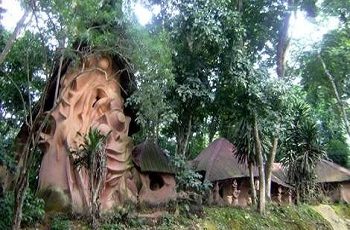Nigeria has a population of 177 million people with many Nigerian traditional festivals. It is obviously the largest black nation on planet Earth very rich in cultural heritages that cut across over 250 ethnic tribes and 420 languages.
The people here, are conscious of their rich Nigerian traditional festivals and this is obvious in the several Nigerian traditional festivals put on exhibition across various societies and regions in the country. There are so many traditional festivals. The importance of all these festivals can be overemphasized.

Although there are over 200 Nigerian traditional festivals in the Nigeria (every day is devoted to a specific festival in Ile-Ife, Osun State).
Here are top 10 local Nigerian traditional festivals
- Nigerian traditional festivals #1 Eyo Festival
The reason can’t be far-fetched why some people refer to it as the Adamu Orisha festival, but the Eyo festival in Lagos Island is a very remarkable celebration that entices tourists from all over the country. Participants in this festival are decorated in white clothing, and the key attraction of the festival is the Eyo masquerades performing in white regalia. They lead a colorful demonstration through the city, and it is a magnificent celebration to be witnessed and to experience the traditional values of the people of Lagos.
Read Also: 10 Niger delta festivals you must love
- Nigerian traditional festivals #2 Calabar Carnival
If you want to observe a demonstration of lively dancers performing in street parades, then you have to avail yourself for the Calabar festival in Cross River State. Here you will see thousands of performers wearing colorful regalia and feathered crowns that go with the spirit of the celebratory season. This great festival does not only fascinate Calabar indigenes from other countries. The state governor and his cabinet and federal ministers of Nigeria are always present to observe the rich, cultural exhibitions of the Calabar people. It lasts for about a week.
Read Also: 7 things forbidden to Hausa culture and tradition
- Nigerian traditional festivals #3 Lagos/Abuja Carnival
Whether in Lagos or Abuja carnival, that means you will be having a good time. If you’re lucky enough to be in Lagos or Abuja when the festivals commence. There are successions of cultural displays that tell the story of the indigenous people, and that project the image of the people for their state. Here you witness a colorful display of local fashion dressed in the most imaginative costumes. - Nigerian traditional festivals #4 Osun Oshogbo Festival
Although each day in any year is devoted to a divinity festival in Ile-Ife, Osun State, the most remarkable celebration of the state is the Osun Oshogbo festival that takes comes up once in a year in Osogbo, followed by the Olojo festival of Ile-Ife. The Osun Oshogbo festival is a celebration devoted to the Osun river goddess, and through the festivities, people come from all areas of life to render sacrifice to the river goddess and to make petitions. It is a week-long celebration that takes place between July and August in the holy forest groves of Osun river. - Nigerian traditional festivals #5 Sango Festival
The Sango festival is habitually celebrated in Oyo township of Oyo State. It is a yearly festival devoted to Sango, the most influential divinity and one of the earliest Alaafin of the Old Oyo Kingdom in ancient times. The festival showcases Sango worshippers eating and removing fire from their mouths and nostrils, and summoning thunder to airstrike across the land in the spirit of the fiery, earliest ruler of the Old Oyo peoples.
Read Also: 7 major travel destinations in Delta State
- Nigerian traditional festivals #6 Ojude-Oba Festival
The Ojude-Oba festival is being organized in Ijebu-Ode of Ogun State; a cultural activity where the indigenes and those in the displacement come home to give tribute to their ruler, the Awujale of Ijebuland. There is a huge demonstration of cultural street parades, indigenous song deliveries, Dane-gun salutes, and other indigenous displays. This indigenous event takes place during the yearly Ileya festival or the Muslim Eid-el-Kabir celebrations. - Nigerian traditional festivals #7 Ofala Festival
This is an Igbo festival that takes place in the Anambra State of Nigeria, and it is a yearly festivity that gets the Obi of Onitsha and his traditional rulers appear in full cultural ceremonial dress and noble staffs to exhibit bravery, war conquest, affluence, and power among others. It is a celebration that displays the rich background of the Igbo people, and an event that attracts native indigenes from one place to another and beyond to Anambra during the celebrations. - Nigerian traditional festivals #8 Argungun Fishing Festival
The Argungun fishing festival takes place every year in Kebbi State. It is a weeklong ethnic activity that ends in a fishing competition. The fisherman that catches the largest fish of the year is given a prize by the town and the state government. Throughout the fishing rivalry, able-bodied men enter into the river at the given sign, together with their fishing gourds and nets to hunt for the biggest catch of the year. The largest fish caught is weighed on a scale. - Nigerian traditional festivals #9 New Yam Festival
The New Yam festival is a renowned celebration in all parts of Nigeria but given more importance in the eastern part of the country. During the New Yam festival, no farmer is permitted to eat any new yam yields until the chosen day. When the king observes the early culture of the land and then announces eating the new yam harvests open to the people. - Nigerian traditional festivals #10 Durbar Festival
The Durbar festival is largely celebrated in Maiduguri, Kano, Zaria, and Katsina in northern Nigeria. It is the most expressive and popular festival in northern Nigeria. It features horse rides and racing, and enactment of ancient wars fought on horse-backs. The festival is usually attended by the Emirs and their council of chiefs and is usually a weeklong activity that mostly holds toward the end of the month of Ramadan.

